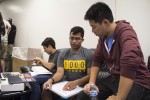Bent over the glow of her laptop screen, Alyza Malunao worked to create a personal stylist app for iOS before the clock wound down on the 12-hour hacking event hosted at UCLA.
Malunao, a third-year computer science student at UC Riverside, was among more than 100 students from Southern California who participated in UCLA’s Local Hack Day to create mobile applications and other programming projects.
UCLA was one of 33 schools that participated in Local Hack Day events across the country Saturday. Local Hack Day is sponsored by Major League Hacking, a group that organizes hackathons throughout the year for students interested in programming.
The UCLA Association for Computing Machinery, a computer science club on campus, organized the event at UCLA, which was free and open to anyone interested.
Akshay Bakshi, the president of ACM and a third-year computer science student, said the goal of Local Hack Day at UCLA was to give students a preview of larger hackathons and a chance to work on computing projects with teammates.
UCLA’s hackathon on Saturday aimed to mimic the same environment as larger hackathons, but there were fewer restrictions on participants and less time than some other larger events, Bakshi said.
Malunao said she participated in Local Hack Day at UCLA to hang out with friends and work on a computing project in a relaxed environment. She added that she thinks hackathons are the best way to start new computer science projects and learn new computing skills.
“Hackathons are a great way to learn from people that have more experience than you,” Malunao said.
Malunao came to UCLA’s hackathon with her friend Shilpa Chirackel, also a third-year UC Riverside computer science student. Chirackel said she enjoyed participating in hackathons because the events allowed her to pursue her own interests in a less structured setting than some of her classes.
The Boelter Hall room was crowded with students busily working on their projects and learning new computing skills required to complete their projects on Saturday.
Both Malunao and Chirackel said they think the hardest part of hackathons is coming up with an idea for a project. The 12-hour time constraint limited the types and depth of projects students could create.
“We spent a good two hours just trying to brainstorm,” Chirackel said.
Malunao and Chirackel eventually decided to build a clothing stylist app for iOS during the 12-hour hackathon period.
Once they had the idea, they found tutorials and resources available online to help them complete the project. Every half hour, participants in the hackathon could view a short introduction to different types of computing technologies to help students finish their projects on time.
Nick Liu, a third-year computer science and engineering student at UCLA, said this was his second time participating in a hackathon. Liu and his teammates worked to build a social networking app for iOS. The app would enable people to send friends questions that could be answered with only a “yes” or “no” response.
For his first two years at UCLA, Liu studied electrical engineering, but he changed his major to computer science and engineering because he liked that he could build programs immediately without knowing many details about programming.
Liu said his hackathon experience on Saturday was completely different from his first hackathon at USC, which lasted for 36 hours instead of 12. Liu added that his first hackathon was more tiring and physically demanding than the hackathon at UCLA. He said he did not sleep after the first day due to the time constraint and the pressure to finish the project at USC.
Bakshi said he thinks many students participated in the hackathon at UCLA to learn, and not to gain financial benefits or make a business deal.
“Most of the time, it’s more about the spirit of creation,” Bakshi said.
